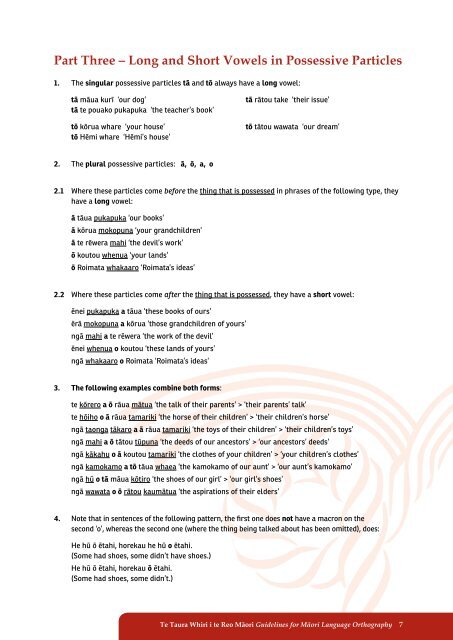Guidelines_for_Maori_Language_Orthography
Guidelines_for_Maori_Language_Orthography
Guidelines_for_Maori_Language_Orthography
Create successful ePaper yourself
Turn your PDF publications into a flip-book with our unique Google optimized e-Paper software.
Part Three – Long and Short Vowels in Possessive Particles<br />
1. The singular possessive particles tā and tō always have a long vowel:<br />
tā māua kurī ‘our dog’<br />
tā te pouako pukapuka ‘the teacher’s book’<br />
tō kōrua whare ‘your house’<br />
tō Hēmi whare ‘Hēmi’s house’<br />
tā rātou take ‘their issue’<br />
tō tātou wawata ‘our dream’<br />
2. The plural possessive particles: ā, ō, a, o<br />
2.1 Where these particles come be<strong>for</strong>e the thing that is possessed in phrases of the following type, they<br />
have a long vowel:<br />
ā tāua pukapuka ‘our books’<br />
ā kōrua mokopuna ‘your grandchildren’<br />
ā te rēwera mahi ‘the devil’s work’<br />
ō koutou whenua ‘your lands’<br />
ō Roimata whakaaro ‘Roimata’s ideas’<br />
2.2 Where these particles come after the thing that is possessed, they have a short vowel:<br />
ēnei pukapuka a tāua ‘these books of ours’<br />
ērā mokopuna a kōrua ‘those grandchildren of yours’<br />
ngā mahi a te rēwera ‘the work of the devil’<br />
ēnei whenua o koutou ‘these lands of yours’<br />
ngā whakaaro o Roimata ‘Roimata’s ideas’<br />
3. The following examples combine both <strong>for</strong>ms:<br />
te kōrero a ō rāua mātua ‘the talk of their parents’ > ‘their parents’ talk’<br />
te hōiho o ā rāua tamariki ‘the horse of their children’ > ‘their children’s horse’<br />
ngā taonga tākaro a ā rāua tamariki ‘the toys of their children’ > ‘their children’s toys’<br />
ngā mahi a ō tātou tūpuna ‘the deeds of our ancestors’ > ‘our ancestors’ deeds’<br />
ngā kākahu o ā koutou tamariki ‘the clothes of your children’ > ‘your children’s clothes’<br />
ngā kamokamo a tō tāua whaea ‘the kamokamo of our aunt’ > ‘our aunt’s kamokamo’<br />
ngā hū o tā māua kōtiro ‘the shoes of our girl’ > ‘our girl’s shoes’<br />
ngā wawata o ō rātou kaumātua ‘the aspirations of their elders’<br />
4. Note that in sentences of the following pattern, the first one does not have a macron on the<br />
second ‘o’, whereas the second one (where the thing being talked about has been omitted), does:<br />
He hū ō ētahi, horekau he hū o ētahi.<br />
(Some had shoes, some didn’t have shoes.)<br />
He hū ō ētahi, horekau ō ētahi.<br />
(Some had shoes, some didn’t.)<br />
Te Taura Whiri i te Reo Mäori <strong>Guidelines</strong> <strong>for</strong> Mäori <strong>Language</strong> <strong>Orthography</strong> 7


